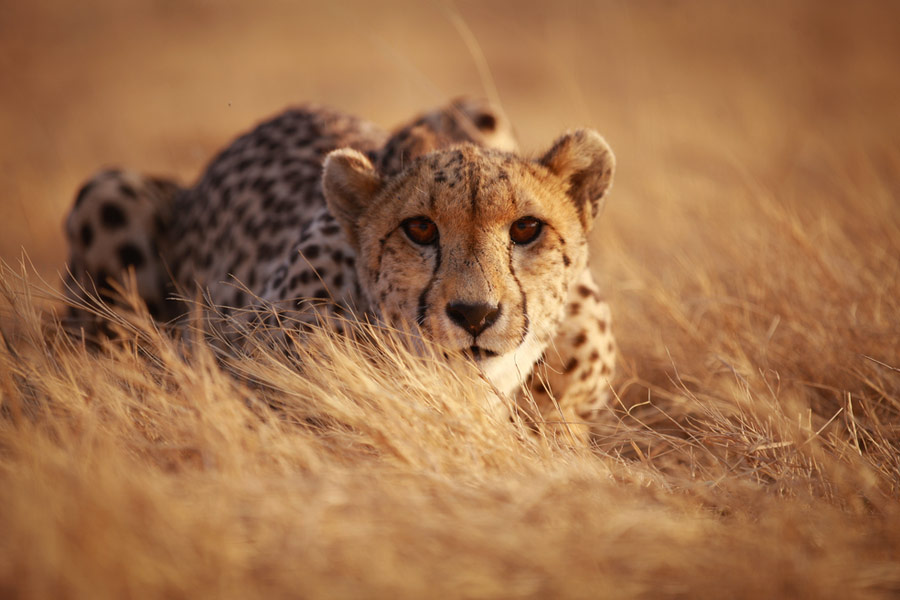The death of two male cheetahs within a week at the Kuno National Park (KNP) in Madhya Pradesh was caused by septicemia - blood poisoning by bacteria - which was a result of the radio collars worn around their necks in the prevailing wet conditions, an expert said.
Male cheetah Suraj, translocated from South Africa, died at the KNP in Sheopur on Friday, while another translocated male cheetah Tejas died on Tuesday.
The death of two cheetahs pushed the fatality count to eight, including three cubs, in less than four months, causing concern over the future of the cheetah reintroduction programme launched with a lot of fanfare by Prime Minister Narendra Modi in September last year.
"Extreme wet conditions are causing the radio collars to create infection. Both the cheetahs died of septicemia," Vincent van der Merwe, a South African cheetah metapopulation expert told PTI from Mongolia, when contacted.
"Those were not wounds inflicted by other animals. They were cases of dermatitis and myiasis followed by septicemia," he said.
Merwe said he manages the Cheetah Metapopulation Project in South Africa on behalf of The Cheetah Metapopulation Initiative and was responsible for bringing cheetahs to India from South Africa.
Asked about the fate of the cheetah project in India, he sounded optimistic.
"We still have 75 per cent of the founder population alive and well in India. So all is still on track with observed mortality well within normal parameters for wild cheetah reintroduction," he added.
When cheetah Tejas died on Tuesday, the state forest department officials said they suspected it to be a fallout of infighting among the animals. They said that wounds were found around the neck of the deceased feline.
On Friday, cheetah Suraj was found dead with wounds around his neck and back and flies and insects were hovering around, they added.
Radio collars have been fitted around the necks of the translocated cheetahs to monitor their movement for safety and other issues, officials said.
When contacted, KNP director Uttam Sharma said they have sent the post-mortem reports of the two cheetahs to the senior authorities in Bhopal, but refused to elaborate.
Another forest official requesting anonymity said that they suspect that both the felines died due to some infection.
"But before we could act, the infection was spreading and taking its toll. It spreads very fast," he added.
Efforts to contact Principal Chief Conservator of Forests (Wildlife) J S Chauhan and his deputy Subharanjan Sen for their comment on the cause of the death of the two cheetahs and the post-mortem reports proved futile.
On Friday, MP Forest Minister Vijay Shah said the exact cause of (Suraj's) death will be known from the post-mortem report.
When asked about the fatalities, he pointed out that the three cubs that died were malnourished from birth itself, while other deaths were from fights during mating or eating, which is common among animals.
Rejecting any allegation of mismanagement leading to the deaths, Shah said the governments in India, South Africa and Namibia were involved in the management of cheetahs and everything was being done as per their directions.
"Therefore, it is not proper to say these (deaths) were due to negligence. The PMO (Prime Minister's Office) is keeping a close watch on everything. Everything is being done on the direction of the PMO. There is no negligence on our part," he had said.
Sheopur district, which houses the KNP, has received 321.9 mm rainfall between June 1 and July 15 whereas the normal rainfall for this period was 161.3 mm, the India Meteorological Department's Bhopal Centre Duty Officer S N Sahu said.
He said that Sheopur received 185 mm from July 8 to 14, the period during which the two cheetahs died, Eight Namibian cheetahs - five female and three male - were released into quarantine enclosures at KNP on September 17 last year at a high-profile event attended by PM Modi. In February this year, 12 more cheetahs arrived at KNP from South Africa.
The birth of four cubs had taken the total count of cheetahs to 24, but eight deaths have brought the number down to 16.
The fastest land animal was declared extinct in the country in 1952.
Except for the headline, this story has not been edited by The Telegraph Online staff and has been published from a syndicated feed.










